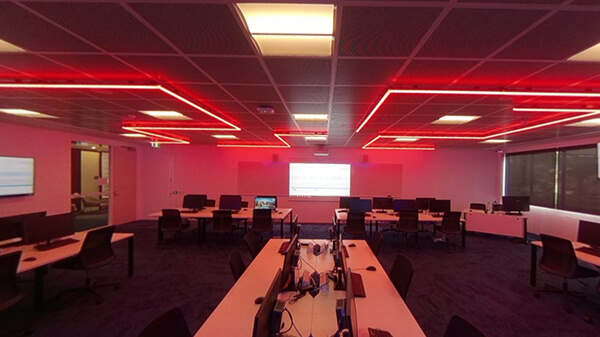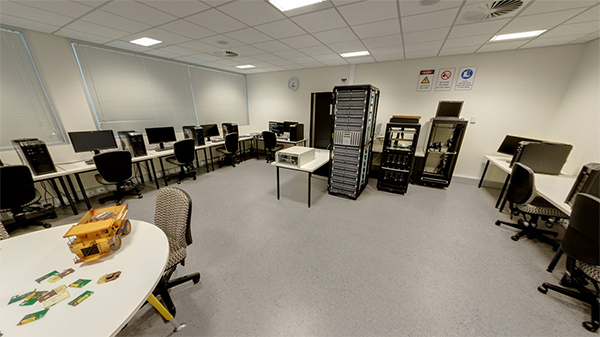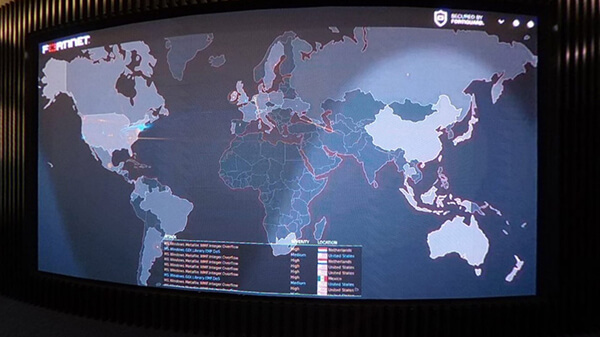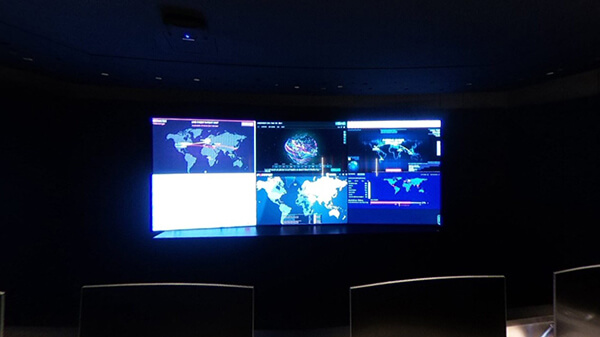Course code Y89
Bachelor of Science (Cyber Security)
Creative thinkers made here.
Creative thinkers made here.

A unique study experience
A new agreement between ECU and the University of Portsmouth means you can study Cybercrime, Security and Intelligence in Perth and the UK and graduate with a unique dual degree.
Read moreWhy study at ECU?
Toggle between study options for Domestic or International students
About this Course
Cyber security skills are in demand across the world. ECU is the only Australian university recognised as an International Cybersecurity Centre of Excellence.
In this course you’ll study network security and vulnerability assessment, information security policy and governance, digital forensics, and ethical hacking. You’ll also delve into network enabled devices like smartphones, tablet devices, and the Internet of Things.
Australian Qualifications Framework (AQF) level
This course has been accredited by ECU as an AQF Level 7 Bachelor Degree Award.
Course code Y89
Entry requirements
70 Indicative ATAR
ECU admission and English language requirements apply.
See Course Entry for further information.
Fees
Commonwealth supported - estimated 1st year indicative fee AUD $8,400
See Fees and Scholarships for further information.
Availability & Campus
| Location | Semester 1 | Semester 2 |
|---|---|---|
| Joondalup | FT PT | FT PT |
| Mount Lawley | ||
| South West | ||
| Online | FT PT | FT PT |
About this Course
Cyber security skills are in demand across the world. ECU is the only Australian university recognised as an International Cybersecurity Centre of Excellence.
In this course you’ll study network security and vulnerability assessment, information security policy and governance, digital forensics, and ethical hacking. You’ll also delve into network enabled devices like smartphones, tablet devices, and the Internet of Things.
Australian Qualifications Framework (AQF) level
This course has been accredited by ECU as an AQF Level 7 Bachelor Degree Award.
Course code Y89
CRICOS code 077146A
Entry requirements
ECU admission and English language requirements apply.
See Course Entry for further information.
Fees
International students - estimated 1st year indicative fee AUD $40,100
See Fees and Scholarships for further information.
Availability & Campus
| Location | Semester 1 | Semester 2 |
|---|---|---|
| Joondalup | FT | FT |
| Mount Lawley | ||
| South West | ||
| Online | FT PT | FT PT |
Course Entry
Admission requirements you'll need to meet for this course.
-
All applicants must meet the academic admission requirements for this course. The indicative or guaranteed ATAR is as published (where applicable) or academic admission requirements may be satisfied through completion of one of the following:
- AQF Cert IV;
- Successfully completed 0.25 EFTSL of study at bachelor level or higher at an Australian higher education provider (or equivalent);
- Undergraduate Certificate;
- Special Tertiary Admissions Test;*
- University Preparation Course;*
- Indigenous University Orientation Course;*
- Aboriginal University Readiness Assessment; or*
- Experience Based Entry Scheme.*
* Further information can be found on the Study course entry page.
For international students, requirements include your secondary school results.
-
English competency requirements may be satisfied through completion of one of the following:
- Year 12 English ATAR/English Literature ATAR grade C or better or equivalent;
- Special Tertiary Admissions Test;*
- IELTS Academic Overall band minimum score of 6.0 (no individual band less than 6.0);
- Successfully completed 1.0 EFTSL of study at bachelor level or higher in the UK, Ireland, USA, NZ or Canada;
- University Preparation Course;
- Indigenous University Orientation Course;*
- Aboriginal University Readiness Assessment;*
- AQF Diploma, Advanced Diploma or Associate Degree;
- Successfully completed 0.375 EFTSL of study at bachelor level or higher at an Australian higher education provider (or equivalent); or
- Other tests, courses or programs defined on the English Proficiency Bands page.
* Further information can be found on the Study course entry page.
Course Entry
Admission requirements you'll need to meet for this course.
-
All applicants must meet the academic admission requirements for this course. The indicative or guaranteed ATAR is as published (where applicable) or academic admission requirements may be satisfied through completion of one of the following:
- AQF Cert IV;
- Successfully completed 0.25 EFTSL of study at bachelor level or higher at an Australian higher education provider (or equivalent);
- Undergraduate Certificate;
- Special Tertiary Admissions Test;*
- University Preparation Course;*
- Indigenous University Orientation Course;*
- Aboriginal University Readiness Assessment; or*
- Experience Based Entry Scheme.*
* Further information can be found on the Study course entry page.
For international students, requirements include your secondary school results.
-
English competency requirements may be satisfied through completion of one of the following:
- Year 12 English ATAR/English Literature ATAR grade C or better or equivalent;
- Special Tertiary Admissions Test;*
- IELTS Academic Overall band minimum score of 6.0 (no individual band less than 6.0);
- Successfully completed 1.0 EFTSL of study at bachelor level or higher in the UK, Ireland, USA, NZ or Canada;
- University Preparation Course;
- Indigenous University Orientation Course;*
- Aboriginal University Readiness Assessment;*
- AQF Diploma, Advanced Diploma or Associate Degree;
- Successfully completed 0.375 EFTSL of study at bachelor level or higher at an Australian higher education provider (or equivalent); or
- Other tests, courses or programs defined on the English Proficiency Bands page.
* Further information can be found on the Study course entry page.
Course Details
Semester availability
Semester 1: Study full-time at Joondalup or Online
Semester 1: Study part-time at Joondalup or Online
Semester 2: Study full-time at Joondalup or Online
Semester 2: Study part-time at Joondalup or Online
Course Structure
| Unit Code | Unit Title | Credit Points |
|---|---|---|
| SCI1125 | Professional Science Essentials | 15 |
| CSP1150 | Programming Principles | 15 |
| MAT1252 | Mathematics for Computing | 15 |
| CSI1241 | Systems Analysis | 15 |
| Unit Code | Unit Title | Credit Points |
|---|---|---|
| CSG1105 | Applied Communications | 15 |
| CSI1101 | Computer Security | 15 |
| ENS1161 | Computer Fundamentals | 15 |
| CSG1207 | Systems and Database Design | 15 |
| Unit Code | Unit Title | Credit Points |
|---|---|---|
| CSI2108 | Cryptographic Concepts | 15 |
| CSI2450 | IoT and OT Security | 15 |
| CSP2101 | Scripting Languages | 15 |
| CSG3309 | IT Security Management | 15 |
| Unit Code | Unit Title | Credit Points |
|---|---|---|
| CSI3207 | Network Security Fundamentals | 15 |
| CSG2344 | Project Methods and Professionalism | 15 |
| CSI2107 | Software Reverse Engineering | 15 |
| CSG2305 | Computer Forensics | 15 |
| Unit Code | Unit Title | Credit Points |
|---|---|---|
| CSI3208 | Ethical Hacking and Defence | 15 |
| MAT3120 | Machine Learning and Data Visualisation | 15 |
| CSI3350 | Enterprise Security and Governance | 15 |
| CSI3351 | Cyber Security Incident Detection and Response | 15 |
Year 3 - Semester 2
| Unit Code | Unit Title | Credit Points |
|---|---|---|
| CSG3101 ^ | Applied Project | 30 |
| Elective Unit | x 2 | 30 |
| Unit Code | Unit Title | Credit Points |
|---|---|---|
| CSI3750 ^ | Professional Placement (Computing and Security) | 60 |
^ Core Option
Y89|9
For more detailed unit information for this course take a look at our Handbook. To organise your life for next semester visit the Teaching timetable.
Student handbookCourse notes
Important course notes
-
Students have the opportunity to seek a Work Integrated Learning placement with an industry partner, equivalent to one semester of full-time study.
Attendance requirements
Students are required to complete a placement which is equivalent to one semester of full-time study. Whilst attendance is negotiated with the WIL host organisation, typically students will be expected to undertake a minimum of 300 hours over a maximum of 17 weeks. Typical full-time placements usually comprise 450 hours of professional placement.
Clearances and/or Risk Management Protocols Required
Students, the WIL host organisation and the school's WIL Coordinator must complete a WIL documentation pack (which includes all required OSH and Risk Assessment documents) before the placement can commence. WIL host organisations may have additional clearance requirements of applicants, including evidence of police clearance or non-disclosure agreements.
There may also be vaccination or other similar requirements, including those imposed by government or third-party placement hosts, that apply to Professional Placements which form part of your course. Please consider this requirement before applying for Professional Placement and speak with the WIL and Course Coordinator if this raises any concerns. You may not be able to complete the Professional Placement unit if you are unable to meet the placement requirements.
Course learning outcomes
- Apply comprehensive knowledge of concepts, principles and techniques in the cyber security discipline to both theoretical as well as practical situations.
- Exercise critical thinking and judgement to investigate and solve problems relating to cyber security issues in digital systems and networks.
- Apply creative thinking to identify and solve cyber security challenges.
- Use digital technologies and cyber security software tools for assessing and evaluating cyber security information.
- Apply communication skills to demonstrate independence in design and analysis of cyber security solutions and presenting documented results.
- Incorporate an awareness of cross-cultural issues and demonstrate cultural and indigenous competence in professional practice in the cyber security area.
- Work collaboratively in the application of knowledge and skills to identify issues and make decisions relevant to cyber security.
- Demonstrate creativity and initiative to generate ideas for planning and implementing independent projects in the cyber security discipline.
Professional Recognition
CourseAccredited by: Australian Computer Society (ACS)
Course Details
Semester availability
Semester 1: Study full-time at Joondalup or Online
Semester 1: Study part-time Online
Semester 2: Study full-time at Joondalup or Online
Semester 2: Study part-time Online
Course Structure
| Unit Code | Unit Title | Credit Points |
|---|---|---|
| SCI1125 | Professional Science Essentials | 15 |
| CSP1150 | Programming Principles | 15 |
| MAT1252 | Mathematics for Computing | 15 |
| CSI1241 | Systems Analysis | 15 |
| Unit Code | Unit Title | Credit Points |
|---|---|---|
| CSG1105 | Applied Communications | 15 |
| CSI1101 | Computer Security | 15 |
| ENS1161 | Computer Fundamentals | 15 |
| CSG1207 | Systems and Database Design | 15 |
| Unit Code | Unit Title | Credit Points |
|---|---|---|
| CSI2108 | Cryptographic Concepts | 15 |
| CSI2450 | IoT and OT Security | 15 |
| CSP2101 | Scripting Languages | 15 |
| CSG3309 | IT Security Management | 15 |
| Unit Code | Unit Title | Credit Points |
|---|---|---|
| CSI3207 | Network Security Fundamentals | 15 |
| CSG2344 | Project Methods and Professionalism | 15 |
| CSI2107 | Software Reverse Engineering | 15 |
| CSG2305 | Computer Forensics | 15 |
| Unit Code | Unit Title | Credit Points |
|---|---|---|
| CSI3208 | Ethical Hacking and Defence | 15 |
| MAT3120 | Machine Learning and Data Visualisation | 15 |
| CSI3350 | Enterprise Security and Governance | 15 |
| CSI3351 | Cyber Security Incident Detection and Response | 15 |
Year 3 - Semester 2
| Unit Code | Unit Title | Credit Points |
|---|---|---|
| CSG3101 ^ | Applied Project | 30 |
| Elective Unit | x 2 | 30 |
| Unit Code | Unit Title | Credit Points |
|---|---|---|
| CSI3750 ^ | Professional Placement (Computing and Security) | 60 |
^ Core Option
Y89|9
For more detailed unit information for this course take a look at our Handbook. To organise your life for next semester visit the Teaching timetable.
Student handbookCourse notes
Important course notes
-
Students have the opportunity to seek a Work Integrated Learning placement with an industry partner, equivalent to one semester of full-time study.
Attendance requirements
Students are required to complete a placement which is equivalent to one semester of full-time study. Whilst attendance is negotiated with the WIL host organisation, typically students will be expected to undertake a minimum of 300 hours over a maximum of 17 weeks. Typical full-time placements usually comprise 450 hours of professional placement.
Clearances and/or Risk Management Protocols Required
Students, the WIL host organisation and the school's WIL Coordinator must complete a WIL documentation pack (which includes all required OSH and Risk Assessment documents) before the placement can commence. WIL host organisations may have additional clearance requirements of applicants, including evidence of police clearance or non-disclosure agreements.
There may also be vaccination or other similar requirements, including those imposed by government or third-party placement hosts, that apply to Professional Placements which form part of your course. Please consider this requirement before applying for Professional Placement and speak with the WIL and Course Coordinator if this raises any concerns. You may not be able to complete the Professional Placement unit if you are unable to meet the placement requirements.
Course learning outcomes
- Apply comprehensive knowledge of concepts, principles and techniques in the cyber security discipline to both theoretical as well as practical situations.
- Exercise critical thinking and judgement to investigate and solve problems relating to cyber security issues in digital systems and networks.
- Apply creative thinking to identify and solve cyber security challenges.
- Use digital technologies and cyber security software tools for assessing and evaluating cyber security information.
- Apply communication skills to demonstrate independence in design and analysis of cyber security solutions and presenting documented results.
- Incorporate an awareness of cross-cultural issues and demonstrate cultural and indigenous competence in professional practice in the cyber security area.
- Work collaboratively in the application of knowledge and skills to identify issues and make decisions relevant to cyber security.
- Demonstrate creativity and initiative to generate ideas for planning and implementing independent projects in the cyber security discipline.
Professional Recognition
CourseAccredited by: Australian Computer Society (ACS)
Fees and Scholarships
Fees
- AUD $8,400 - Commonwealth supported estimated 1st year indicative fee 1
Note
1 The 'estimated 1st year indicative fee' is provided as a guide only, based on a typical enrolment of students undertaking the first year of this course. At ECU, you pay for the individual units you enrol in, not an overall course fee, so the total cost of your course will vary, depending on what units you choose. An indicative fee will be provided with your course offer, however you can use our Course Fee Calculator to estimate the actual amount you'll need to pay. ECU fees are adjusted annually.
Some units require the payment of a fee for incidental goods or services required to complete those units. For more information and the full list of incidental fees for courses and units, visit What are Incidental Fees.
Scholarships
ECU has a scholarship program that provides many opportunities each year to students undertaking studies here.
Find a scholarshipCareer Opportunities
This course prepares students for careers in the field of cyber security, including areas such as network security, digital forensics, vulnerability assessment, security risk assessment, penetration testing, threat hunting, and incident response.
Possible future job titles
Cyber Security Analyst, Cyber Security Officer, Technical IT Security Officer, Network Security Engineer, Digital Forensic Practitioner (Acquisition and Analysis), Information Security Auditor, Information Security Analyst, Security Consultant, Software Auditor, Systems Administrator (Security), Information Security Officer, Penetration Tester
Fees and Scholarships
Fees
- AUD $40,100 - International students estimated 1st year indicative fee 1
Note
1 The 'estimated 1st year indicative fee' is provided as a guide only, and has been calculated based on a typical enrolment of students undertaking the first year of this course. At ECU, you pay for each individual unit you enrol in, not an overall course fee, so the total cost of your course will vary, depending on what units you choose. An indicative fee will be provided with your course offer, however you can use our Course Fee Calculator to estimate the actual amount you'll need to pay. ECU fees are adjusted annually.
Some units require the payment of a fee for incidental goods or services required to complete those units. For more information and the full list of incidental fees for courses and units, visit What are Incidental Fees.
Scholarships
ECU has a scholarship program that provides many opportunities each year to students undertaking studies here.
Find a scholarshipCareer Opportunities
This course prepares students for careers in the field of cyber security, including areas such as network security, digital forensics, vulnerability assessment, security risk assessment, penetration testing, threat hunting, and incident response.
Possible future job titles
Cyber Security Analyst, Cyber Security Officer, Technical IT Security Officer, Network Security Engineer, Digital Forensic Practitioner (Acquisition and Analysis), Information Security Auditor, Information Security Analyst, Security Consultant, Software Auditor, Systems Administrator (Security), Information Security Officer, Penetration Tester
Need some help deciding what to study?
Our future student events include a mix of on-campus and online sessions designed to help you decide what to study at ECU.
Creative thinkers start here
Facilities
View our facilities
Explore your options
Explore your options through the following media
Creative thinkers start here
Facilities
View our facilities
Explore your options
Explore your options through the following media
Student stories
Quick guide to uni-speak
-
-
The Australian Qualifications Framework (AQF) is the national regulator of qualifications in the Australian education and training system. The AQF defines the essential characteristics, including the required learning outcomes, of the different types of qualifications issued across the higher education systems in Australia.
-
ATAR is the Australian Tertiary Admission Rank, the primary criterion for entry into most undergraduate university courses in Australia. The ATAR is a percentile score which denotes a student's ranking relative to their state-wide peers upon completion of their secondary education.
-
CRICOS is the Commonwealth Register of Institutions and Courses for Overseas Students. A CRICOS code is allocated to education institutions (like ECU) who are approved to recruit, enrol and deliver education to overseas students. Courses with a CRICOS code are available to international students who meet the entry requirements.
-
A major, or unit set, is your chosen area of in-depth study in an undergraduate course. It usually involves 8 units of study, or one-third of the units in a 3-year degree. Talk to your Student Information Office if you need help choosing a major subject.
-
Minors include between 4 and 6 study units in a specific discipline. Not all courses require you to complete a minor. Your minor subject doesn't appear on your printed degree (parchment), but is part of your academic transcript.
-
If you're enrolled in 3 or more units in a semester this is considered full-time study. To complete most 3-year degrees studying full-time you'll need to complete 4 units per semester, i.e. 24 units over 3 years.
-
-
-
If a course is available to study part-time you can generally expect it to take twice as long to complete as it would in full-time mode. Part-time students are enrolled in 1 or 2 units maximum per semester.
Note: International students who hold a student visa can only choose the full-time study option for our courses. This is to ensure the course is completed within the duration of the student visa.
-
Most courses start in Semester 1 each year, usually in the last week of February. Some courses can be started in Semester 2 (we call this mid-year). There's a week of Orientation before each semester to help you get used to uni life.
-
A lot of our courses start in Semester 2 each year, usually in the last week of July. We call this mid-year. There's a week of Orientation beforehand to help you get used to uni life.
-
We use a points system to make it easier for you to understand your study progress. Most Bachelors degree study units are allocated 15 credit points. If you're studying a 3-year full-time degree you'll need to successfully complete 360 credit points - that's 24 units x 15 points per unit.
-
These are compulsory units you have to successfully complete as part of your course.
-
An elective is a unit you choose to study that counts towards your course requirements, but isn't compulsory. For some courses we recommend elective units. In some situations, a course coordinator may approve an elective unit as a replacement for a compulsory one.
-
Quick guide to uni-speak
-
-
The Australian Qualifications Framework (AQF) is the national regulator of qualifications in the Australian education and training system. The AQF defines the essential characteristics, including the required learning outcomes, of the different types of qualifications issued across the higher education systems in Australia.
-
ATAR is the Australian Tertiary Admission Rank, the primary criterion for entry into most undergraduate university courses in Australia. The ATAR is a percentile score which denotes a student's ranking relative to their state-wide peers upon completion of their secondary education.
-
CRICOS is the Commonwealth Register of Institutions and Courses for Overseas Students. A CRICOS code is allocated to education institutions (like ECU) who are approved to recruit, enrol and deliver education to overseas students. Courses with a CRICOS code are available to international students who meet the entry requirements.
-
A major, or unit set, is your chosen area of in-depth study in an undergraduate course. It usually involves 8 units of study, or one-third of the units in a 3-year degree. Talk to your Student Information Office if you need help choosing a major subject.
-
Minors include between 4 and 6 study units in a specific discipline. Not all courses require you to complete a minor. Your minor subject doesn't appear on your printed degree (parchment), but is part of your academic transcript.
-
If you're enrolled in 3 or more units in a semester this is considered full-time study. To complete most 3-year degrees studying full-time you'll need to complete 4 units per semester, i.e. 24 units over 3 years.
-
-
-
If a course is available to study part-time you can generally expect it to take twice as long to complete as it would in full-time mode. Part-time students are enrolled in 1 or 2 units maximum per semester.
Note: International students who hold a student visa can only choose the full-time study option for our courses. This is to ensure the course is completed within the duration of the student visa.
-
Most courses start in Semester 1 each year, usually in the last week of February. Some courses can be started in Semester 2 (we call this mid-year). There's a week of Orientation before each semester to help you get used to uni life.
-
A lot of our courses start in Semester 2 each year, usually in the last week of July. We call this mid-year. There's a week of Orientation beforehand to help you get used to uni life.
-
We use a points system to make it easier for you to understand your study progress. Most Bachelors degree study units are allocated 15 credit points. If you're studying a 3-year full-time degree you'll need to successfully complete 360 credit points - that's 24 units x 15 points per unit.
-
These are compulsory units you have to successfully complete as part of your course.
-
An elective is a unit you choose to study that counts towards your course requirements, but isn't compulsory. For some courses we recommend elective units. In some situations, a course coordinator may approve an elective unit as a replacement for a compulsory one.
-










